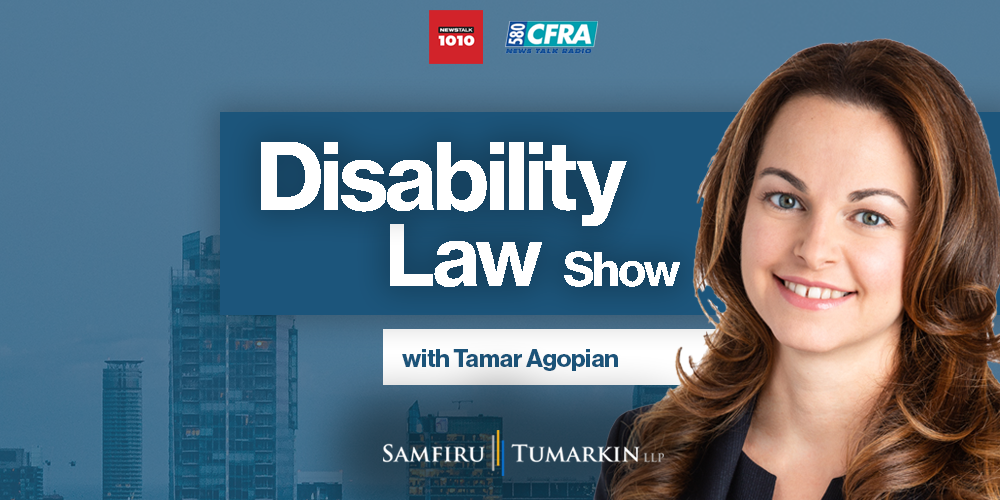Disability Law Show Bell Radio – S3 E33

Episode Summary
Insufficient medical information, relocating while on disability benefits, taxable benefits, and more on Season 3 Episode 33 of the Disability Law Show on Newstalk 580 CFRA in Ottawa.
Listen below as Tamar Agopian, Senior Associate at Samfiru Tumarkin LLP and Ottawa disability lawyer, guides you through the proper steps to take when the insurance company cuts off or denies your long-term disability claim. Get the advice you need and the compensation you deserve from a disability lawyer in Ontario.
Listen to the Episode
Episode Notes
What should I do if my claim is denied due to insufficient medical information?
Insurance adjusters will often use insufficient medical information as a reason to deny claims even though it is an easy fix for claimants. Claimants should speak to any individual that is part of their treatment and provide all records to the adjuster. If an adjuster still claims there are insufficient medical reports there could be other factors involved and the insurance adjuster is not being open and honest with the claimant. Insurance adjusters might not believe the information is inconsistent, they have to inform the claimant.
I’ve been on LTD for 13 years because of an injury that prevents me from working. My LTD benefits are under a private disability policy that has ‘own occupation’ protection. Despite this, the insurer recently cut me off on that basis. They sent me a letter that says I can do a less physical job. I’m about to lose my home. What do I do?
Insurance companies are obligated to follow the disability policy and the necessary tests outline in the policy in order for claimants to receive benefits. Claimants who have their own occupation protection, should not be denied benefits as the “any occupation” clause does not apply to them. Insurance companies are responsible for compensating claimants for consequential losses, such as healthcare expenses but rarely own up to their obligations. It is important once a disability claim has begun, for the disability lawyer to determine whether or not there are consequential losses and possible damages.
Are disability benefits considered income and do the benefits get taxed?
If an employer is paying the premium for benefits, it is considered a taxable benefit. Disability benefits are considered income support in order to help individuals recover from their health issues and return to work. However, benefits are not always considered income for tax benefits in all situations. Claimants who are unsure whether or not their benefits will be taxed should inquire from their insurance adjusters or seek legal counsel.
My brother has been dealing with different insurance companies for car accidents and disability benefits. Bottom line is that his doctors are telling him he’s not likely to ever work again, so he’s decided to move to B.C. as insurers are easier to deal with there. Is this true?
Most insurance companies are national and so policies are likely treated the same in British Columbia as well as Ontario. Claims that arise in certain provinces and a claimant has to move, theoretically, a relocation should not affect the claim. However, there are some disability policies that disqualify claimants from receiving certain benefits if they are no longer within a specific region. It is important for claimants to be transparent and honest with their insurance companies about their situation.
If someone has been terminated from their employment, can they still get disability benefits?
There is typically a window of time after a claimant loses their job while on LTD that can still claim benefits. It is important to remember that the time frame is usually narrow and claimants should apply for benefits while they still have coverage. Claimants who are on disability benefits are terminated, should still continue to receive benefits. Employees should continue to receive disability benefits as long as their treating medical teams deem the individual unable to work.
LEARN MORE
Termination of employment due to Illness
Employment issues and Long-term Disability Claims
I initially went off work for anxiety and depression. I’m still getting LTD benefits, but I recently got a letter that my benefits will end next year when the definition in my policy changes. Will the insurance company still cut off my benefits if I’ve developed complications from other health issues since I’ve been off?
LEARN MORE
Anxiety Disorders and Long-term Disability
Insurance companies that plan on ending benefits hope that the claimant will not challenge the denial. Claimants should note that if the initial condition has changed to include other illnesses, it ultimately should not matter to the insurer. The diagnosis and condition itself should not matter in order to determine whether or not a claimant receives benefits, but instead the symptoms and ability to work. Claimants that require medical procedures and extensive treatment cannot and should not be ignored by insurers as most policies encompass both physical and psychological illnesses.




